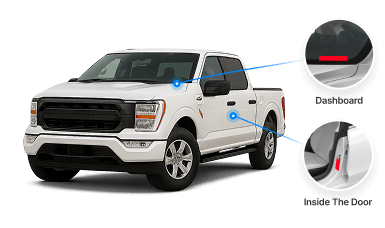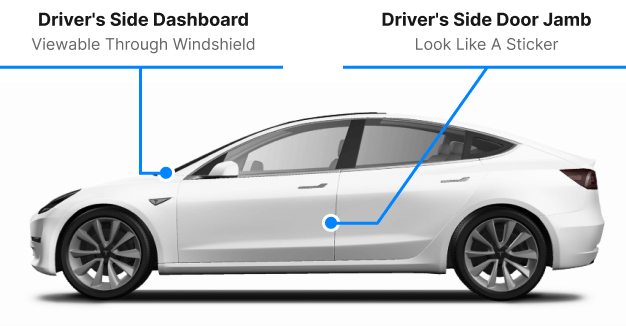
How to Use a Genesis VIN Decoder to Understand Your Car
Your Genesis VIN holds key details about your car’s history, build, and more....
Looking for the VIN?
Here is there you’ll find it:

A vehicle identification number (VIN) is a unique alphanumeric code assigned to every car and vehicle manufactured for use in Iowa and beyond. This identifier acts as the fingerprint of a vehicle, containing essential details such as the make, model, production year, and other vehicle specifications. It helps track important data for millions of vehicles manufactured each year, offering transparency for buyers and sellers. As the VIN becomes quite important in coming up with the fair market value of a car, it is crucial as it reveals the history and condition of the car. Secondly, it would be impossible to verify the identity of a vehicle without such a critical code.
Modern VINs consist of 17 characters, a standard introduced in 1981 to unify vehicle information worldwide. Before this, motor vehicles often used VINs with varying lengths, making it harder to track data consistently. For anyone purchasing a used car, understanding this change is crucial, as older vehicles may still have non-standard VIN formats. The 17-character VIN now provides comprehensive details about a car’s identity and history.
These entities ensure that every vehicle on Iowa roads has a valid, traceable VIN for legal and safety purposes.

A VIN is a powerful tool for accessing detailed information about a vehicle's past. Iowa VIN checks allow buyers and sellers to uncover critical details such as title information, ensuring there are no ownership disputes or liens. The VIN also reveals data about reported accidents, helping assess potential damage or safety concerns. Additionally, it provides insight into open recalls, alerting owners to unresolved safety defects. With a VIN, people in Iowa will be in a position to check the authenticity and historical data of an automobile to assure them that their decisions are properly founded. This number is used by lenders, insurers, and state authorities to keep proper records of a vehicle's existence and track its legal and safety status throughout its life. For prospective buyers, Iowa VIN lookup can reveal whether a car has been salvaged, rebuilt, or deemed a total loss.

Running an IA free vin check is essential to uncover your car's history before buying or selling. It helps identify if the vehicle has been labeled as a salvage vehicle, protecting you from costly surprises. An Iowa VIN check can also expose odometer fraud, ensuring the mileage is accurate and hasn’t been tampered with. Additionally, it provides detailed information about the engine type, helping verify that it matches the manufacturer’s specifications for the car.
| Red Flag | What It Means | Why It Matters |
|---|---|---|
| Salvage Title | Indicates the vehicle has been deemed a total loss by an insurance company. | This could signal major repairs, affecting safety and resale value. |
| Odometer Rollback | The recorded mileage has been altered to appear lower than actual. | Misleads buyers about the car's wear and tear. |
| Unresolved Recalls | The car has open safety recalls that have not been addressed. | Poses potential safety risks for the driver and passengers. |
| Multiple Owners | The vehicle has had an unusually high number of previous owners. | May indicate reliability issues or frequent problems. |
| Title Issues | Discrepancies or liens found in the vehicle's title information. | Creates legal complications during ownership transfers. |
| Accident History | Record of significant reported accidents in the car's past. | Could mean hidden structural or mechanical issues. |
| VIN Cloning | A duplicate or fake VIN is used to disguise a stolen vehicle. | Leads to legal trouble and potential loss of the vehicle. |
| Flood Damage | Evidence the vehicle has been damaged by flooding, often leading to electrical and mechanical issues. | Impacts long-term reliability and resale value. |
A vehicle history report delivers comprehensive insights into a car’s past, helping buyers make informed decisions. VIN reports reveal crucial details such as odometer readings, ensuring the mileage matches the car's condition. They also disclose whether the vehicle has any open recall, allowing owners to address unresolved safety issues. Additionally, reports include theft records, confirming if the car was ever reported stolen. Beyond these key checks, vehicle history reports provide vehicle specs, verifying the car's original features, including engine size and trim, to ensure authenticity during a purchase or sale. A VIN report usually offers a full picture of the car's legal and maintenance history for added peace of mind.
To perform a VIN lookup in Iowa, start by entering the VIN into a reliable VIN decoder tool. This process retrieves detailed information about a used car, including its manufacturing details, accident history, and theft records. A VIN lookup also provides insights into the vehicle's history, such as prior ownership and title status, helping you verify the car’s authenticity and avoid potential legal or financial risks.
| Statistic | Value |
|---|---|
| Total Registered Vehicles | 4,612,891 |
| Top Registered Vehicle Types | - Multipurpose Vehicles: 1,378,916 - Automobiles: 1,063,446 - Small Regular Trailers: 468,160 |
| Average Daily Traffic (2022) | 111,500 vehicles |
| Traffic Fatalities (2023) | 375 |
| Speeding Convictions (2022) | 114,178 |
| Seatbelt Violation Convictions (2022) | 11,961 |
| Animal-Vehicle Collisions (2023) | Iowa ranks 6th in the nation, with a 1 in 63 chance of drivers hitting an animal. |
| Natural Disaster-Related Vehicle Damage (2023) | Iowa experienced significant severe weather events, including tornadoes and flooding, impacting vehicles. |
Iowa’s lemon laws protect buyers from defective vehicles that fail to meet safety standards after multiple repair attempts. These laws require vehicles to pass inspection and operate reliably under normal use. An Iowa VIN check is an essential step for identifying potential lemon law concerns, as it reveals prior repairs, manufacturer buybacks, or defects flagged by the Motor Vehicle Division. A thorough Iowa VIN check helps confirm if the car can pass inspection, ensuring compliance with legal and safety requirements. This process safeguards buyers from unknowingly purchasing vehicles with hidden, unresolved issues.
The Iowa resident shall make an application for the Iowa registration within 30 days of purchase or establishment of residency through their local County Treasurer's Office. If the vehicle is currently titled out of state, the owner shall surrender the out-of-state title and provide proof of insurance along with a completed Iowa application for title and registration. A VIN inspection may also be required for the vehicle to verify the VIN and check for compliance with minimum state standards. On approval, the owner is given the registration document, which is to be kept in the vehicle. This process ensures legal operation on Iowa roads and is crucial for maintaining accurate state records. Prompt registration is required to avoid fines and penalties. For new Iowa residents, timely registration also ensures seamless access to local services and compliance with state laws.
For a reliable Iowa VIN check, EpicVIN is the top choice. EpicVIN provides in-depth VIN search and full vehicle history reports regarding any accidents, titles, and previous damages. The service will grant effective and easy access to the most recent information on time to make an informed vehicle decision.
Yes, it is advisable that you request an Iowa seller for the VIN before you buy a vehicle. The VIN shall assist you in conducting a detailed Iowa VIN check, inspecting the history of the car, its accidents, if any, of its title status, and any other probable red flags.
Yes, checking a VIN number online in Iowa is safe when using trusted services. Avoid unverified websites to ensure data privacy and reliable results.
While the VIN does not enable you to trace the exact location of a car, it opens up important information on the history and ownership records of a vehicle. You get handy check-ups on the existence of ownership, possible theft, and legal status.
Failing to register a vehicle in Iowa within the required timeframe can result in fines, late fees, and additional penalties. New residents or buyers are allowed 30 days to get the vehicle registered. Delayed registration may also lead to legal complications.
Discover expert tips, news and advice on buying and maintaining used vehicles

Your Genesis VIN holds key details about your car’s history, build, and more....

If you're in the market for a fast and affordable vehicle, read our detailed r...

Discover how hail damage affects car value, resale options, and repairs, and l...